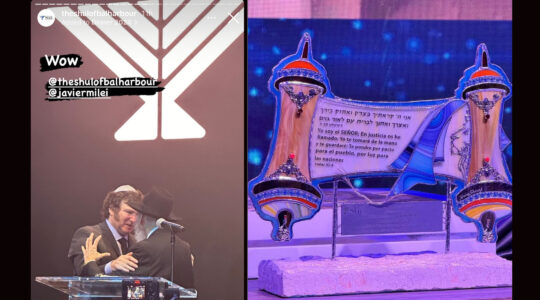
Dr. Alona Raucher-Sternfeld, an Israeli volunteer with Save a Child’s Heart, performs a post-operation echo exam on a Chinese baby in Hebei Children’s Hospital in Shijiazhuang, China
(Alison Klayman)
SHIJIAZHUANG, China (JTA) — “Where is Yang’s heart?” Dr. Alona Raucher-Sternfeld cooed in Hebrew to 5-year-old Yang Bin as she prepared him for surgery aimed at repairing his tiny heart.
As she danced her fingers on his belly, the language barrier disappeared and the boy’s previously defiant exterior melted into giggles.
Yang Bin was one of about 80 children who traveled, some hundreds of miles, to see the visiting medical staff from Israel, all of whom are volunteers with Save a Child’s Heart, a charity based at the Wolfson Medical Center in Holon.
The team of 15 doctors, nurses and medical technicians set up shop at Hebei Children’s Hospital in Shijiazhuang, some 170 miles southwest of Beijing, continuing a partnership that began 10 years ago.
The group has provided surgeries for more than 2,000 children from more than 33 countries. More than 40 percent of the patients are from Africa, and another 45 percent are from the Palestinian territories, Jordan and Iraq. Doctors who visit these areas generally perform check-ups and select patients to take back to Israel for operations.
But China is not Zanzibar, and it’s not Iraq. Thanks to the country’s economic boom, an examination room in Shijiazhuang that was nearly bare just two years ago now includes a computer, a Photosmart printer, and a 3-foot high cart with a monitor and echocardiography machine.
The technological advances, impressive by Chinese standards, enable operations to take place here rather than in Israel. Still, the Israelis come prepared with some of their own equipment, too. Raucher-Sternfeld took one look at the hospital’s echo machine and asked the staff to wheel it to the hall. She pulled her own GE model from its sleek silver carrying case and plugged it in — the difference between a clunky, decades-old desktop and a new Notebook.
“I like my machine,” she said. “It can record and store the data.”
But the Chinese staff was disappointed.
“Our machine is only six months old,” one doctor said, shaking his head.
Israel might be just a few steps ahead of their Chinese colleagues, but it is a crucial few steps. Since Save a Child’s Heart began its partnership with Hebei Children’s Hospital in 1998, Israeli experts have returned eight times and brought more than 10 Chinese nurses and doctors to Israel for training.
“This face-to-face training helps open new ways of thinking and gives our patients the care they deserve,” said Dr. Wang Jianming, the chief of pediatric surgery at Hebei who studied at Wolfson in 2000.
The cooperation with China coincided with Israel’s own advances in pediatric cardio care. As recently as the 1980s, Israeli children with heart problems often sought treatment abroad; Israeli surgeons were studying abroad as well.
Eventually there developed “more than enough qualified heart surgeons for all the Israeli children who need heart surgery, and the Israeli system was in a position to reach out and help others,” said Simon Fisher, the director of operations for Save a Child’s Heart.
Anita Jiang, an operating room nurse, spent six months training in Holon.
“In Israel they were hard working and strict about procedure, but also treated the sick children with patience and warmth,” Jiang said.
Professional training is a major goal of the program, but children like Yang Bin are the real reason the Israeli medical team left their homes for China.
Before he turned a year old, the boy was diagnosed with ventricular septal defect, known as VSD. Four years later he was well past the age when he should have had surgery. His grandfather Yang Li saw a 28-second news item about the Israelis’ visit and immediately embarked on the 125-mile trip from his village.
The grandfather understood the severity of Yang Bin’s problem. A neighbor also had a child with VSD who died when he was approximately Yang’s age.
As his grandfather waited, Israeli and Chinese surgeons Lior Sasson and Han Jiangang worked together to repair a hole between the ventricles of the boy’s heart. Yang Li insisted for the entire four-hour operation that he wasn’t nervous.
“The foreign doctors are very good, they will not make a mistake,” he said.
Indeed, two days later Yang Bin already was out of intensive care. By the time the Israeli doctors left for the airport, all eight children who had surgeries were moved out of intensive care.
“Yang stayed at home and is different from the other children,” Raucher-Sternfeld said as she checked the Doppler image of his heart to verify that the operation was a success. “In two months he can become one of them and go to school. Maybe even the Olympics.”





